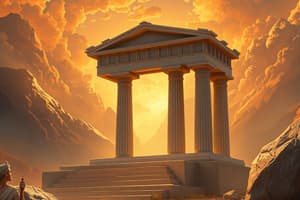Podcast
Questions and Answers
What is the term for the period between the Persian Wars and the rise of Alexander the Great?
What is the term for the period between the Persian Wars and the rise of Alexander the Great?
- Classical Greece (correct)
- Hellenistic Greece
- Roman Greece
- Pre-Classical Greece
Who were the leaders of the Greek city-states engaged in war during the Persian Wars?
Who were the leaders of the Greek city-states engaged in war during the Persian Wars?
Athens and Sparta
The Athenian political system called demokratia meant that all citizens were equal in their relationships with other Greek city-states.
The Athenian political system called demokratia meant that all citizens were equal in their relationships with other Greek city-states.
False (B)
What significant construction did Pericles oversee using Delian League tribute money?
What significant construction did Pericles oversee using Delian League tribute money?
What dramatic genres were produced under the patronage of Pericles?
What dramatic genres were produced under the patronage of Pericles?
What was the outcome of the Peloponnesian War?
What was the outcome of the Peloponnesian War?
The system of self-governance devised by Cleisthenes is called ______.
The system of self-governance devised by Cleisthenes is called ______.
Which historian is notable from classical Greece?
Which historian is notable from classical Greece?
Flashcards are hidden until you start studying
Study Notes
Classical Greece Overview
- Classical Greece spans from the beginning of the Persian Wars in the fifth century B.C. to the rise of Alexander the Great in 323 B.C.
- The period was marked by conflict, including wars between Greeks and Persians and later between Athenians and Spartans.
- Cultural and political achievements flourished, producing significant figures like Herodotus, Hippokrates, and Socrates, as well as democratic governance known as demokratia ("rule by the people").
Wars and Athenian Dominance
- Greek city-states united against the Persian Empire, achieving key victories such as the sack of Sardis (498 B.C.) and the Battle of Marathon (490 B.C.).
- Despite defeats at Thermopylae (480 B.C.), the Greeks ultimately triumphed at Salamis, leading to the rise of Athenian power.
- In 507 B.C., Cleisthenes introduced a democratic system enabling male citizens over 18 to participate in the Assembly (ekklesia).
- Demokratia allowed random selection of officials and required them to govern in the best interest of the people, although it did not promote equality among city-states.
Delian League and Athenian Imperialism
- Athens formed the Delian League in 478 B.C. to safeguard Greek territories from Persian influence, effectively establishing its dominance.
- Tribute collected from allies enriched Athens, transforming it into a wealthy imperial powerhouse.
- Pericles, an influential Athenian general in the 450s, used tribute funds to support citizens and cultural initiatives, ensuring participation in politics through wages.
Art, Architecture, and Culture
- Under Pericles, tribute money financed the reconstruction of Athens, resulting in architectural wonders like the Parthenon, dedicated to Athena.
- The era witnessed a flourishing of dramatic arts, with playwrights such as Aeschylus, Sophocles, Euripides, and Aristophanes gaining acclaim for their works that explored human relationships and societal themes.
- Cultural achievements emphasized humanism, logic, and order, defining the artistic and political landscape of classical Greece.
Decline of the Classical Era
- Athenian imperialism fostered discord among Delian League partners, culminating in the Peloponnesian War (431-404 B.C.) against Sparta.
- Spartan victory led to a decline in Athenian political power, though cultural achievements persisted throughout the fourth century B.C. Despite ongoing disorder, the essence of classical culture continued to thrive.
Studying That Suits You
Use AI to generate personalized quizzes and flashcards to suit your learning preferences.




